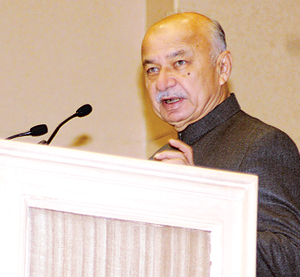INDIAN ARMED FORCES CHIEFS ON
OUR RELENTLESS AND FOCUSED PUBLISHING EFFORTS

SP Guide Publications puts forth a well compiled articulation of issues, pursuits and accomplishments of the Indian Army, over the years

I am confident that SP Guide Publications would continue to inform, inspire and influence.

My compliments to SP Guide Publications for informative and credible reportage on contemporary aerospace issues over the past six decades.
- Prime Minister witnesses 'Bharat Shakti' – a Tri-Services Firing and Manoeuvre Exercise in Pokhran, Rajasthan
- Interim Defence Budget 2024-25 — An Analysis
- Union Defence budget 2024
- Prime Minister Modi Commemorates Indian Navy Day in a Grand Ceremony
- Prime Minister Modi Flies in the LCA Tejas
- New Chapter in India-Italy Defence Ties
- Airpower beyond Boundaries
India facing multifarious internal security challenges: Home Minister

The Union Home Minister Sushilkumar Shinde, who inaugurated the three day conference of Directors General of Police (DGPs) in New Delhi recently, said that India is facing multifarious challenges on the internal security front in the form of militancy in J&K, insurgency in some parts of the Northeast, the threat of left-wing extremism (LWE) and terrorism in hinterland of the country.
“Indian Mujahiddeen, which draws its motivation and sustenance from inimical forces operating from across the western border has been responsible for three out of four major terrorist attacks in our hinterland this year. These include Hyderabad twin blasts and the series of blasts at Bodhgaya and Patna. Another blast that took place in Bengaluru was the handiwork of some misguided fundamentalist youth and remnants of Al-Ummah. However, I am happy to inform you that all these cases have been successfully worked out. I compliment officers of intelligence agencies and police forces for having made critical breakthroughs in this regard. Here, I would like to make a special mention of the apprehension of Yasin Bhatkal who was wanted in a large number of cases of bomb blasts in different parts of the country. Our security agencies have also arrested Abdul Karim, also known as Tunda, a wanted terrorist in different bomb blast cases. These arrests constitute a major breakthrough in our fight against the terrorism and demonstrate the resolve of the Government of India to bring to justice all those who commit crimes of terrorism in our country. It is important that the leads emanating from the investigations are vigorously pursued to apprehend all those associated with this network. Our security forces have to remain constantly alert and act in a cohesive manner to deal with these challenges.
“In our fight against terrorism, the Multi Agency Centre (MAC) has emerged as an effective platform for proper coordination between Central and State agencies. The scope of MAC is now being extended to more than 450 districts across the country. I believe there is a dire need for upward flow of intelligence into MAC for dissemination to stakeholders, which can be achieved by upgrading the capability of special branches of state police. This is only possible if states upgrade their special branches for which Government of India is prepared to extend all possible help.
Left-wing extremism remains another major threat to our national security. Despite reduction in violence levels, naxals have continued to target security forces and those reposing faith in our democratic polity. The attack on political leaders in Chhattisgarh and the killing of a Superintendent of Police in Dumka district of Jharkhand are instances of Naxal brutality. Central and state security forces, however, have achieved notable successes in restricting their areas of influence, denying them fresh recruits and eroding their top leadership. There has also been a drop in the casualty figure of security forces from 111 last year to 97 this year. On the other hand, the number of Naxals killed has gone up to 97 from 71 last year for the same period.
“The Union Government remains committed to root out this menace. It will continue to help the affected states by placing at their disposal CAPFs and support various security as well as development related interventions in Naxal areas. However, the driving force to deal with this problem must come from local initiatives led by the States. The institution of police stations must be strengthened to play a focal role in this fight. It is also imperative to recruit personnel for special forces from local marginalised sections of the society. They would need to be trained and equipped for jungle warfare and put under command of the inspiring police leadership.
“The situation in Jammu and Kashmir (J&K) continues to be a challenge for us. This year, there has been an increase in targeted attacks on security forces resulting in nearly 50 personnel losing their lives. These attacks indicate a nefarious game plan hatched across the border to demoralise our security forces and demonstrate to the people of J&K that the capabilities of militants remain undiminished. There have also been violent actions and ceasefire violations along the border, particularly in Poonch district of Jammu region. Our security forces have responded in right measure and succeeded in neutralising several militant commanders and eliminating 35 terrorists on the line of control (LoC) this year. Security forces, however, cannot afford to lower their guard, particularly in view of Lok Sabha and Assembly elections next year. A fine balance needs to be maintained by them between firm handling of terrorism and adequate restraint in public order situations. This is important to limit civilian casualties and to deny space to separatist elements for fomenting further disturbances.”





